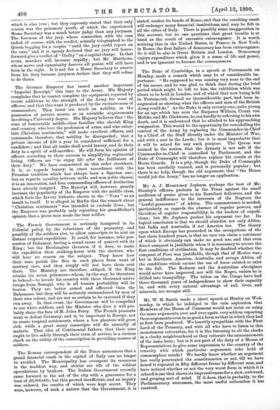The French Government is seriously hampered in its Colonial policy
by the reluctance of the peasantry, and possibly of the soldiers also, to allow conscripts to be sent on distant tropical expeditions. It could, for instance, take pos- session of Dahomey, having a sound cause of quarrel with its King ; but the Boulangists threaten, if it does, to make the expedition their stalking-horse with the electors, who will hear no reason on the subject. They know how their sons perish like flies in such places from want of sanitary care, and they simply will not have them sent there. The Ministry are therefore obliged, if the King retains his seven prisoners—whom, by-the-way, he threatens to behead—to invade his country with three thousand native troops from Senegal, who in all human probability will be beaten. They are better armed and officered than the Dahomans, but they will be seriously outnumbered by men of their own colour, and are not so certain to be executed if they run away. In that event, the Government will be compelled to use white soldiers, and the Minister who does it will pro- bably share the fate of M. Jules Ferry. The French peasants want to defeat Germany, and to be important in Europe, not to create tropical settlements where a few planters will grow rich, while a great many conscripts will die annually of malaria. That idea of Continental fathers, that their sons ought to live safely through their term of service, is a curious check on the utility of the conscription in providing masses of soldiers.


































 Previous page
Previous page